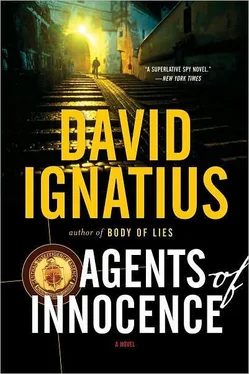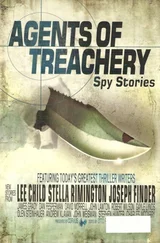David Ignatius - Agents of Innocence
Здесь есть возможность читать онлайн «David Ignatius - Agents of Innocence» весь текст электронной книги совершенно бесплатно (целиком полную версию без сокращений). В некоторых случаях можно слушать аудио, скачать через торрент в формате fb2 и присутствует краткое содержание. Жанр: Шпионский детектив, на английском языке. Описание произведения, (предисловие) а так же отзывы посетителей доступны на портале библиотеки ЛибКат.
- Название:Agents of Innocence
- Автор:
- Жанр:
- Год:неизвестен
- ISBN:нет данных
- Рейтинг книги:3 / 5. Голосов: 1
-
Избранное:Добавить в избранное
- Отзывы:
-
Ваша оценка:
- 60
- 1
- 2
- 3
- 4
- 5
Agents of Innocence: краткое содержание, описание и аннотация
Предлагаем к чтению аннотацию, описание, краткое содержание или предисловие (зависит от того, что написал сам автор книги «Agents of Innocence»). Если вы не нашли необходимую информацию о книге — напишите в комментариях, мы постараемся отыскать её.
Agents of Innocence — читать онлайн бесплатно полную книгу (весь текст) целиком
Ниже представлен текст книги, разбитый по страницам. Система сохранения места последней прочитанной страницы, позволяет с удобством читать онлайн бесплатно книгу «Agents of Innocence», без необходимости каждый раз заново искать на чём Вы остановились. Поставьте закладку, и сможете в любой момент перейти на страницу, на которой закончили чтение.
Интервал:
Закладка:
There were several other items on the tape. One was a conversation between Mumtazz and the Arab man about arrangements for a party; the other sounded like a man and woman making love. The panting and moaning went on for more than twenty minutes, and when the woman began praising the man’s sexual prowess in fluent Italian, one of the colonels turned off the tape.
Eventually they referred the case to General Armani. It seemed to be a potentially delicate matter. Something the Americans should know. Or perhaps, something the Americans shouldn’t know. The colonels weren’t sure. The general would know. He was everything an Italian general should be: tall and trim, silver-gray hair, suave and cunning. Even when he made mistakes, they seemed to younger colleagues to be the right mistakes. The general listened to the tape and then talked to Mumtazz.
“What evidence do you have about the plot to kill the American president?” demanded General Armani. “That is the most important thing you have told us, but there is nothing on the tape about assassination. I think you must be a liar.”
“Of course there is nothing on the tape!” said the Libyan. “Would the Palestinian be so stupid as to talk about such a matter on the telephone?”
They had discussed the plan to kill the president during a meeting in a cafe in Rome, Mumtazz explained. At the meeting, Nabil had asked him to obtain a sharpshooter’s rifle for the job. The plan was to shoot the American president during one of his foreign trips. The Palestinian didn’t say when or where.
General Armani nodded wearily, with a look that said: I believe nothing. In fact, he was unsure about the assassination plot. It was plausible. But then, it was also implausible. The general was certain of only one thing: he had something that would be of profound interest to the American Embassy. The Americans were obsessed about assassination plots. The one sure way to get their attention was to provide intelligence reports that someone was planning to take a potshot at the president. General Armani smiled.
“Basta!” said the general to Mumtazz. Enough.
“Excellency, please,” whined the Libyan. But the general was gone and the guards were taking Omar Mumtazz back to his cell.
General Armani made two copies of the tape. He took one with him to the American Embassy on the Via Veneto. He gave it to the American military attache along with transcripts of the interviews with Mumtazz that detailed the assassination plot. The attache said he was profoundly grateful to General Armani for his help and was certain that his fine work would be appreciated in the highest
councils of NATO.
Spare me, thought the general.
The military attache was the senior representative in Italy of the Defense Intelligence Agency. He sent a flash cable to the DIA operations center and forwarded the tape itself by overnight pouch. His cable included the stunning allegation-“a Palestinian plot to assassinate the president”-that started bells ringing and lights flashing all over Washington. There was much commotion within the national security bureaucracy, rousing the Secret Service, the FBI, the NSC-and, not least, the DIA’s crosstown rival, the Central Intelligence Agency.
General Armani put the second copy of the tape in his briefcase. He called his wife Anna and told her that he would be home late for dinner. When he left the office, he walked briskly down the Via Venti Settembre to Via Delle Quatro Fontane, where he ducked into a cafe and made a quick telephone call.
The general reached his Israeli contact at home. They met an hour later in a quiet cafe off the Via del Corso.
“We ran across something of interest this week,” said the general.
“And what is that, my friend?” said the Israeli. He was smiling and squinting at the general.
“We grabbed a cheap Arab smuggler at the airport. To save himself, the man told us an interesting tale. It involves a Palestinian who seems to be acquiring a small arsenal here in Europe.”
“Who told you these things?” asked the Israeli as if he had not quite heard the name.
“I cannot tell you who. It doesn’t matter, anyway. He is just a cheap hoodlum. I have something better for you.”
“And what is that, my friend?” asked the Israeli, still smiling and squinting.
“The Palestinian. On tape,” said General Armani. He nodded to the newspaper he had placed on the table when he entered the cafe. Inside it was a cassette tape of the Palestinian.
The Israeli nodded. Otherwise, his expression didn’t change. Still the squint. It was the very ordinariness of Israeli intelligence officers that made them trustworthy, the Italian general had concluded long ago. Their bad teeth, bald heads, squinting eyes, poor posture. They were too ordinary to play the self-deceiving games that led most intelligence services to disaster.
General Armani explained the meaning of the code used by the Palestinian. The suits and shoes, and how they really referred to pistols and plastic explosive. The only thing he left out, other than Mumtazz’s name, was the plot to kill the American president. Let the Italians get sole credit for that one.
General Armani left the tape in the folded newspaper when he got up from the table. The Israeli sent the cassette that night to Tel Aviv, where it was added to a growing Mossad file on the activities of Fatah’s intelligence service.
34
Washington/Beirut; May 1972
The CIA attacked the problem systematically. They compiled a list of known Palestinian operatives who might fit the profile of “Nabil” next they prepared an audio analysis of the tape recording, so that the voice could be matched with others on file as neatly as if it were a fingerprint. Then, with help from the NSA, they compared the voice of Nabil to tape recordings of various Palestinian suspects.
In less than a week, it was obvious to agency officials that the CIA had an embarrassing problem on its hands. The voice matched identically with that of someone who was well known to the agency. A Palestinian whose conversations had been recorded at various CIA safehouses for more than two years, and who had nearly been recruited by the agency a year earlier. The files showed that the Palestinian had even been assigned a cryptonym: PECOCK.
Edward Stone interrupted a spring yachting weekend to deal with the “Nabil” crisis. The situation was a nightmare, as far as Stone was concerned. He arrived at his office on a Sunday dressed in white flannel trousers, well-worn Topsiders, and a frayed sweater. The Middle East Division chief pulled the files, read and reread them, and turned the possibilities over in his mind. Was the Palestinian seeking revenge because of the humiliating incident with Marsh? Was Fatah striking back at the United States because of American complicity in the destruction of the fedayeen in Jordan? Were the commandos simply lashing out blindly at the ultimate symbol of American power? The questions went on and on. A threat to assassinate the president was a serious problem in itself. But when the assassin was a former CIA asset-a man who had spurned a recruitment effort-then it was positively a disaster.
Stone saw the Director first thing Monday morning. The Director was in his private dining room, eating his breakfast, when Stone arrived. He was picking the soft doughy bread out of the middle of a hard roll. That was one of the Director’s eccentricities, the taste for soft bread from inside hard rolls. Like many well-bred men, he had invented his own version of table manners.
Stone summarized the intelligence reports. The man on the tape was unquestionably Jamal Ramlawi. There was no reason to doubt the Libyan’s statement that he had provided weapons and explosives to the Palestinian. It was a case that contained the most worrying possibilities, Stone said.
Читать дальшеИнтервал:
Закладка:
Похожие книги на «Agents of Innocence»
Представляем Вашему вниманию похожие книги на «Agents of Innocence» списком для выбора. Мы отобрали схожую по названию и смыслу литературу в надежде предоставить читателям больше вариантов отыскать новые, интересные, ещё непрочитанные произведения.
Обсуждение, отзывы о книге «Agents of Innocence» и просто собственные мнения читателей. Оставьте ваши комментарии, напишите, что Вы думаете о произведении, его смысле или главных героях. Укажите что конкретно понравилось, а что нет, и почему Вы так считаете.












